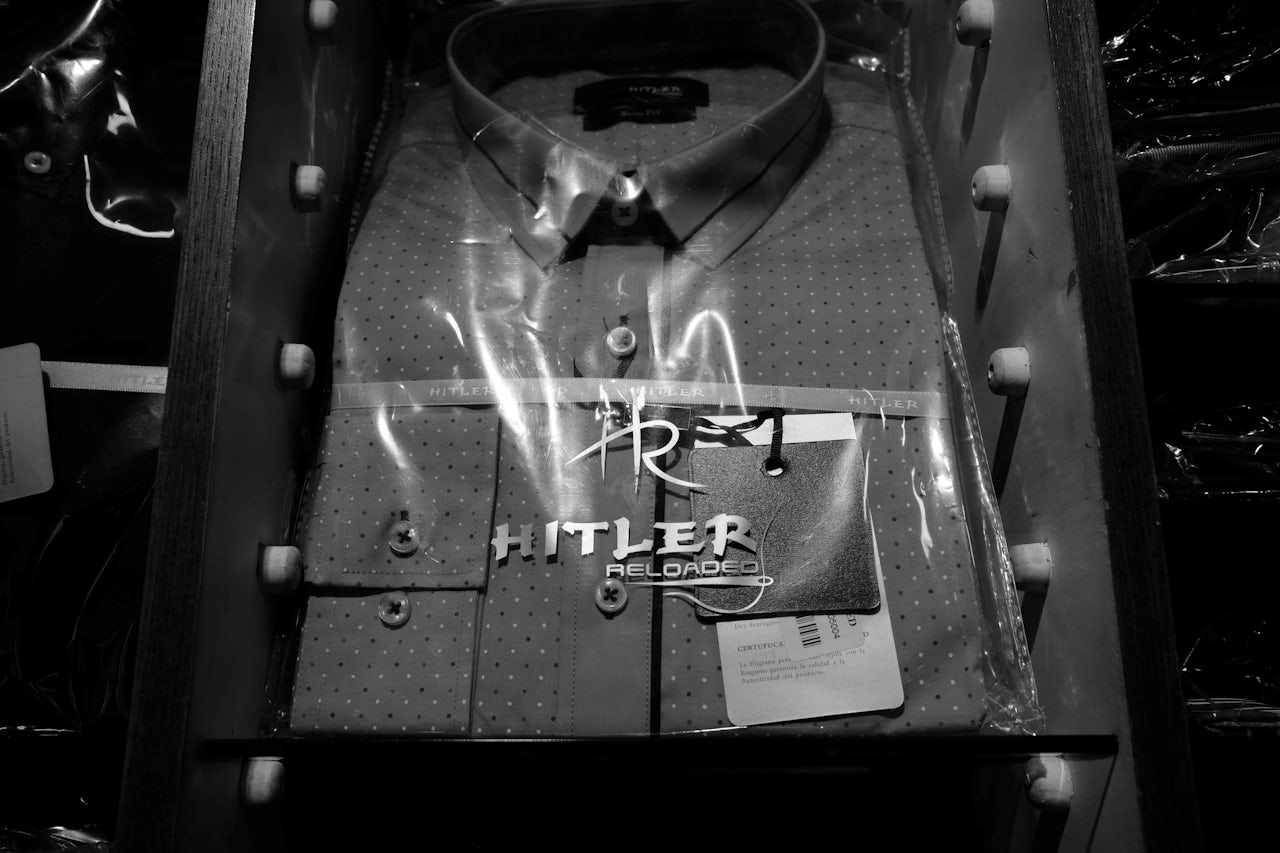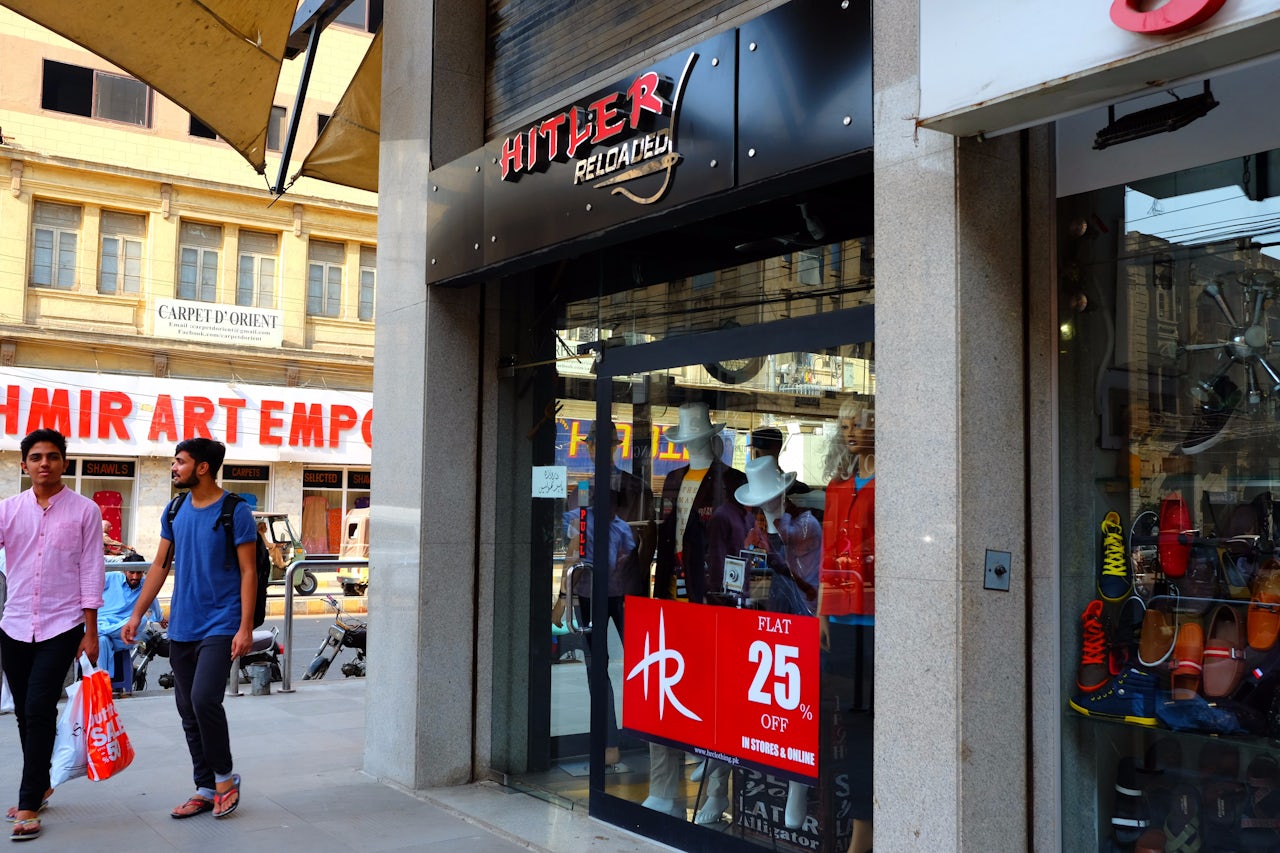The sometimes-haphazard dissemination of Western culture in the developing world is often the subject of internet comedy: Chinese people wearing shirts with incomprehensible and sometimes offensive English, Apple logos on the backs of Bolivian construction workers, Nike swooshes on traditional Indian kurtas. Westerners find it hilarious that the Global South misunderstands their language and icons, despite tattooing incorrect Arabic and Chinese symbols on their bodies
I fall guilty to this as often as the next person. In my travels, capturing the misspelled signs and errant Apple logos is frequently the focus of my iPhone photography — anything for the ‘gram. When I moved to Pakistan, my opportunities to do this became endless. I see some hilarious misinterpretation of English on an almost daily basis, to the point where it’s almost lost its comedic value. But there’s one major exception, and that’s Hitler.
In Pakistan, “Hitler” is everywhere. Often searching for Wi-Fi signals, I’ll sometimes come across one with some permutation of Hitler’s name: “h1tl3r72,” “hitlerhouse,” or the confounding “ManUnitedHitler” combo I saw flicker on and off while sitting in a coffee shop. Stuck in Karachi’s never-ending traffic, I’ll catch a glimpse of “HITLER” emblazoned on the back of a Suzuki passenger van. Occasionally, I’ll see “hitler” spray-painted on a slum wall or stitched onto the polo shirt of a chai-wallah. The most baffling and established example of Hitler’s omnipresence here is a label called “Hitler: Reloaded,” headquartered on the corner of one of Karachi’s biggest markets. It sells moderately priced menswear.
I assumed all these Fuhrer sightings were the unfortunate result of rampant anti-Semitism percolating through Pakistani culture. In addition to the usual pro-Palestine stance taken by most Muslim-majority countries, Israel, and by extension Jews, are the often the scapegoats for, or subjects of, conspiracies against Pakistanis. The myths abound: Israel is attempting to sterilize the masses through polio vaccines, Israel is colluding with India to destroy Pakistan as a state, etc. These are some of the more coherent examples — others involve illuminati and Satanic plots. It doesn’t help that Pakistan’s small Jewish minority has, understandably, mostly left or gone into hiding. The average Pakistani rarely interacts with a Jew face-to-face.
It turns out, however, that the average Pakistani doesn’t know who Hitler is. On one of the occasions I saw a Wi-Fi network featuring the Fuhrer’s moniker — “hitler2,” in this particular case — I was in a small enough neighborhood in which I could deduce which house named their network after ol’ Adolf. When I finally met the man living in the house, I asked him why he named his Wi-Fi network after Hitler. “He was a really strict general in Germany. I like to keep a strict household,” he said.
When I asked him whether he knew about Hitler’s legacy as a sadistic psychopath responsible for the murder of six million Jews, he said he knew Hitler was against Jews but not much else. “I don’t really like Jews,” he added as an afterthought. When I pressed him about why, he gave the usual anti-Zionist, pro-Palestine line echoed by most in this part of the world. An ardent Nazi, though, he was not.
Hitler isn’t the subject of an entire genre of films and books in Pakistan the way it is in Europe and America. Though hundreds of thousands of then-Indian soldiers fought against the Axis of Evil under the British Empire, Pakistani history books don’t teach Hitler’s legacy. There’s no Pakistani equivalent to Inglourious Basterds or Schindler’s List that clearly denote the Nazis and Hitler as the ne plus ultra bad guys in the history of the modern world.
That’s not to say Pakistan exists in a cultural vacuum either. Nearly a century of British rule means modern Pakistan is irrevocably linked to the West for better or for worse. Most illiterate Pakistanis even know a handful of English phrases. One can access most Western movies in the country’s unregulated ripped-DVD markets. Dunkirk played, though briefly, in the multiplex cinemas that are cropping up in major cities. The country passes my tried-and-true globalization indicator: you can see kids with John Cena backpacks even in the most remote Pakistani mountain villages.
But the people who can afford movie tickets and DVDs (and therefore DVD players) compose a small segment of the population. It’s unfair to assume all Pakistanis have no clue about Hitler, but for the vast majority, it’s nothing but a name, or a foreign word that’s cool by virtue of it being foreign.
When I first stumbled upon Hitler: Reloaded, it was January 2016 and Trump was still a laughable jester in the Republican debates. I was in Karachi on a work-related trip and my co-workers and I snickered as we passed by the store. I took, as always, an iPhone photo from a moving car. “Too blurry to post on Instagram,” I thought. I flew back to my home in the U.S. a few days after, Hitler: Reloaded but a distant memory.
Now, with punching Nazis a regular topic of discussion on my Twitter feed, I pass by Hitler: Reloaded almost every day. A few weeks ago, I went to its flagship store for the first time, pretending to shop for my non-existent husband. The store was filled with the odd mixture of menswear oscillating between Express Men’s and Hollister: faded skinny jeans and fitted button downs on one end of the store, satin suit jackets and ties on the other. There was an excellent collection of Fendi knockoff belts with the “F” logos flipped. All the merchandise was subtly labeled with the brand’s “HITLER: Reloaded” logo. The “Reloaded” part has a stylized needle and thread at the end. Nothing seemed particularly Nazi-themed, with perhaps the exception of their polo shirt section.
When I asked a store clerk if he knew who Hitler was, he laughed and said a lot of people come to take pictures in front of the store.
“It’s made us kind of famous, people remember the brand,” he said.
“But do you know why people remember the name?”
“He was really famous, Hitler. A lot of people know about him because he was famous.”
“Right, but do you know why he’s famous?”
At this point, I realized I was bothering some guy at his job who clearly didn’t care strongly about Hitler or Nazis either way. The man sheepishly admitted he knew Hitler was an army general and there was something about Jews but he didn’t know exactly what happened.
When I reached out to the store’s management via email (resulting in an absurd Gmail thread that appears as “Me, Hitler” in my inbox) they said, “In Pakistan, we call Hitler to someone who is smart and clever. Owner’s friends used to call him Hitler so he put this name 15 years ago (This is awkward).”
Hitler: Reloaded’s management seems to understand Hitler means something “awkward” in the West. But in Pakistan, the name is so far removed from any semblance of Nazism and white supremacy that brown Muslims wear it on their business casual without batting an eye.
A year ago, I would mock Hitler: Reloaded’s ignorance whenever I passed it. But now, with the Richard Spencers and Jason Kesslers of the world giving power to Nazi iconography back home, the misguided ignorance of the store is somehow comforting. Hitler, to Pakistanis, doesn’t conjure images of violence and blind hate. If they do know of Hitler, perverse as it may be, they associate him with “strictness” more than gas chambers.
It’s an odd feeling to be an American living abroad right now. Watching the alt-right, neo-Nazi movement unfurl from afar makes American politics feel like a distant nightmare. I can put that reality away as easily as I can shut my phone and my laptop. Ironically, Trump’s “America First” platform has toppled the perception that Americans don’t have the same problems as the rest of the world. Pakistanis sometimes joke Trump was born in Pakistan, in that he acts more like a corrupt caricature of a Pakistani politician than an American one.
It’s clear, though, that the deluge of “Hitler is bad” content in America didn’t do enough to deter a growing minority of Americans from ascribing to his ideology. I’m thousands of miles away from these rallies, but the images of neo-Nazis marching openly still sends a shiver down my spine. I like to joke that when my unborn children ask me why we live in Pakistan and not America, I’ll tell them that it’s because of November 8, 2016. Pakistan is no utopia, but I’ll take a line of misguided but ultimately harmless Hitler-brand menswear over genuine Hitler-loving Americans for now.




